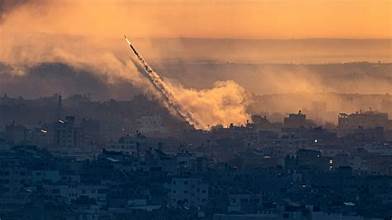
In a major escalation, Israel launched powerful military strikes on Iran early Friday, hitting key nuclear and missile facilities and killing several top Iranian military commanders. The attack raises fears of a full-scale war between Israel and Iran, marking one of the most serious military confrontations since Iran’s 1980s war with Iraq.
Rising Tensions Over Iran’s Nuclear Program Spark Conflict
The attack follows growing tensions over Iran’s rapidly advancing nuclear program. Iran immediately responded by sending waves of drones toward Israel, while Iran’s Supreme Leader Ayatollah Ali Khamenei threatened “severe punishment.”
Countries across the Middle East condemned Israel’s offensive, while global leaders urged both nations to step back and prevent further escalation.
Massive Israeli Airstrikes Hit Multiple Iranian Targets
According to Israel’s military, around 200 fighter jets struck approximately 100 targets across Iran. Intelligence sources revealed that Mossad agents placed explosive drones inside Iran ahead of the attacks, targeting missile launchers near Tehran.
Israel also reportedly smuggled precision-guided weapons into central Iran, which were activated during the strikes to destroy air defense systems. These covert operations remain unconfirmed by independent sources.
Key Iranian Military Leaders Killed
The strikes resulted in the deaths of several top Iranian military leaders, including:
- Gen. Mohammad Bagheri, Chief of Iran’s Armed Forces
- Gen. Hossein Salami, Commander of the Revolutionary Guard
- Gen. Amir Ali Hajizadeh, Head of the Revolutionary Guard’s Ballistic Missile Program
Iran officially confirmed these casualties, which severely weaken Tehran’s military leadership and complicate any direct retaliation plans.
Khamenei added that other senior military officials and nuclear scientists were also killed.
Iran Retaliates with Drone Attack on Israel
In its immediate response, Iran launched over 100 drones at Israel, flying through Iraqi and Jordanian airspace. Israeli defense forces claimed to have intercepted many of these drones before they could reach Israeli territory.
Trump Warns Iran to Make Nuclear Deal
U.S. President Donald Trump urged Iran to resume nuclear negotiations with Washington, warning on his Truth Social platform that if Iran refuses, “Israel’s attacks will only get worse.”
Trump stressed:
“Iran must make a deal before it’s too late. No more death, no more destruction — just do it before nothing is left.”
U.S. Distances Itself from Israeli Strikes
The U.S. government emphasized that Washington was not involved in the attacks. Officials revealed that the U.S. had warned Israel against launching the strikes amid ongoing nuclear talks.
In anticipation of possible retaliation, the U.S. evacuated some diplomats from Iraq and offered voluntary evacuations for military families across the Middle East.
Netanyahu Defends Preemptive Attack on Iran
Israeli Prime Minister Benjamin Netanyahu described the strikes as preemptive self-defense, claiming Iran was dangerously close to developing nuclear weapons.
“This is a clear and present danger to Israel’s very survival,” he said.
Netanyahu vowed to continue military actions “as long as necessary to eliminate the threat.”
Panic Spreads in Israel and Iran
In Israel, civilians rushed to supermarkets to stock up on bottled water and emergency supplies, while preparing bomb shelters for long-term use.
In Iran, museums began moving valuable artifacts into secure vaults for protection.
Iran Accuses Israel of Targeting Residential Areas
Iran’s Supreme Leader Khamenei accused Israel of attacking residential zones, calling the strikes “wicked” and “blood-stained crimes.”
Meanwhile, Israeli opposition leader Yair Lapid, despite being a critic of Netanyahu, publicly supported the military operation. However, public opinion in Israel may shift if Iranian retaliation causes significant civilian casualties.
Hezbollah Condemns Attacks but Avoids Escalation
Lebanon’s Iran-backed militant group Hezbollah condemned Israel’s strikes and offered condolences but stopped short of threatening military action. Hezbollah’s previous war with Israel ended with a U.S.-brokered ceasefire.
IAEA Confirms Israeli Strikes on Natanz Nuclear Site
The International Atomic Energy Agency (IAEA) verified that Israel struck Iran’s uranium enrichment facility at Natanz, a key site in Iran’s nuclear program. The agency is now monitoring radiation levels closely.
Israeli Military Stretched to Its Limits
Israel’s military used aging refueling aircraft to get fighter jets close enough to launch their strikes. It remains unclear whether Israeli jets entered Iranian airspace or fired long-range standoff missiles from neighboring regions like Iraq.
Weeks of Rising Tension Led to Conflict
For weeks, tensions had been mounting as Iran continued expanding its nuclear program. Just before the strikes, the U.S. Embassy in Jerusalem issued a shelter-in-place order for American personnel.
Secretary of State Marco Rubio stated that Israel acted unilaterally, emphasizing:
“We are not involved in the strikes. Our top priority is protecting U.S. forces in the region.”
President Trump is scheduled to meet his National Security Council to review the growing conflict.
Iran’s Nuclear Program Under Global Scrutiny
The IAEA Board of Governors censured Iran for refusing to cooperate with inspectors, marking the first such censure in 20 years. Iran responded by announcing plans to establish a third uranium enrichment site and install advanced centrifuges.
While some intelligence reports suggest Iran would need several months to develop a nuclear weapon, U.S. agencies maintain that Iran currently has no active weapons program.
Global Oil Prices Surge Amid Middle East Conflict
The strikes triggered a spike in global oil prices, with Brent crude briefly rising nearly 8% before settling. Israel’s main airport was temporarily closed due to security concerns.
Contributors: Federman and Frankel reported from Jerusalem. Additional reporting by The Associated Press teams in Tehran, Tel Aviv, Washington, Beirut, and Bangkok.